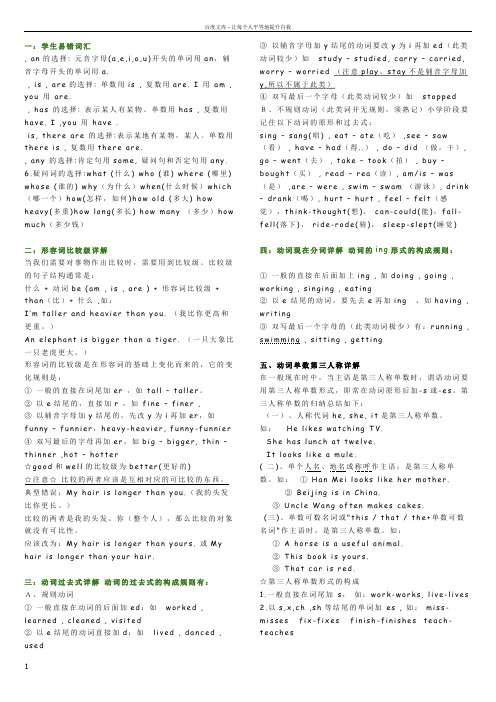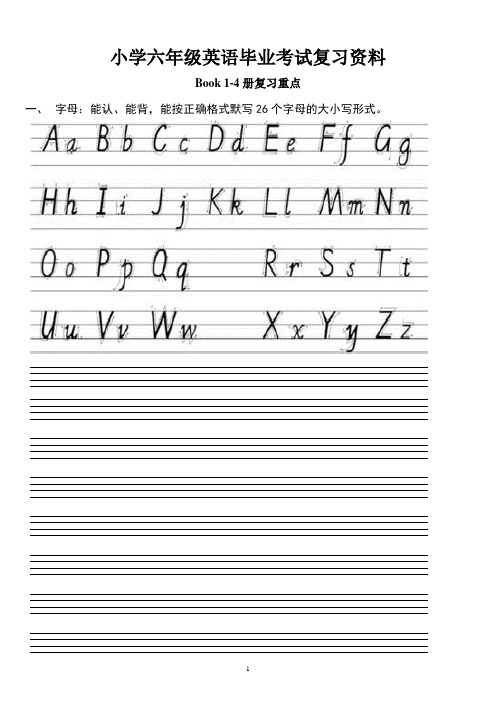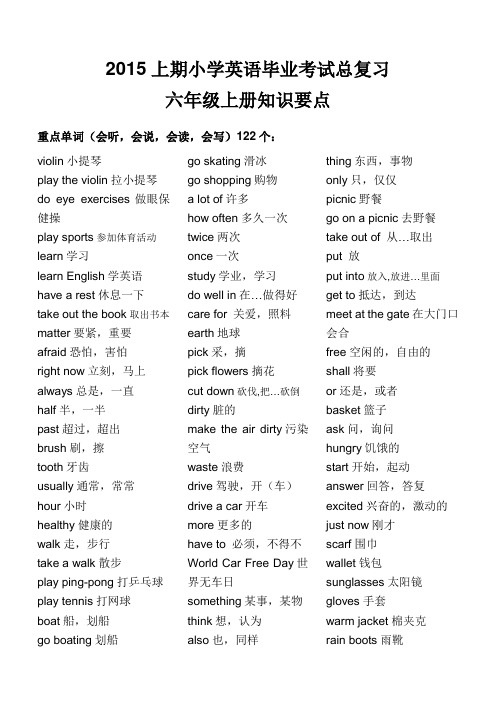2015pep小学英语毕业考总复习重点(三至六年级)
PEP人教版小学六年级毕业班英语复习资料(三至六年级)

百度文库 - 让每个人平等地提升自我1一:学生易错词汇, a n 的选择: 元音字母(a ,e ,i ,o ,u )开头的单词用a n ,辅音字母开头的单词用a., i s , a r e 的选择: 单数用i s , 复数用a r e. I 用 a m , y o u 用 a r e., h a s 的选择: 表示某人有某物。
单数用h a s , 复数用h a v e. I ,y o u 用 h a v e .i s , t h e r e a r e 的选择:表示某地有某物,某人。
单数用t h e r e i s , 复数用t h e r e a r e., a n y 的选择:肯定句用s o m e , 疑问句和否定句用a n y. 6.疑问词的选择:w h a t (什么) w h o (谁) w h e r e (哪里) w h o s e (谁的) w h y (为什么)w h e n (什么时候)w h i c h (哪一个)h o w (怎样,如何)h o w o l d (多大) h o w h e a v y (多重)h o w l o n g (多长) h o w m a n y (多少)h o w m u c h (多少钱)二:形容词比较级详解当我们需要对事物作出比较时,需要用到比较级。
比较级的句子结构通常是:什么 + 动词b e (a m , i s , a r e ) + 形容词比较级 + t h a n (比)+ 什么 ,如:I ’m t a l l e r a n d h e a v i e r t h a n y o u. (我比你更高和更重。
)A n e l e p h a n t i s b i g g e r t h a n a t i g e r. (一只大象比一只老虎更大。
)形容词的比较级是在形容词的基础上变化而来的,它的变化规则是:① 一般的直接在词尾加e r ,如 t a l l – t a l l e r 。
pep小学英语总复习(句型-短语-语法)

pep⼩学英语总复习(句型-短语-语法)PEP 三到六年级的动词词组answer the phone接buy a present买礼物catch butterflies捉蝴蝶clean the room 打扫房间climb mountains爬⼭collect stamps收集邮票come from来⾃,从……来cook dinner做饭cook the meals做饭do an experiment做实验do homework做作业do morning exercises做早操do housework做家务do the dishes 刷碗drink water 喝⽔draw pictures画画eat breakfast吃早饭lunch ,午饭dinner,晚饭, at home 在家fly kites放风筝go to bed睡觉go to school上学go to the cinema去看电影go to a park 去公园go to work上班go home 回家go swimming 去游泳go fishing 去钓鱼go hiking 去郊游go ice-skating 去滑冰go skiing 去滑雪go shopping 去购物go straight 直⾏get up起床have a picnic举⾏野餐have breakfast吃早餐have lunch吃午餐have dinner吃晚饭have Chinese classhave English class上英语课have music class上⾳乐课have P.E. class上体育课have math class上数学课have a cold 感冒have a fever 发烧have a sore throat 嗓⼦疼have a headache 头疼have a toothache ⽛疼like + doing 喜欢做某事look at看……live in 居住listen to music听⾳乐learn Chinese (学中⽂) make a snowman堆雪⼈make kites制作风筝make the bed铺床plant trees种树play chess下棋sweep the floor扫地play football踢⾜球play ping-pong 打乒乓球play sports 做活动play the violin拉⼩提琴play the piano弹钢琴play with…… 玩… put on 穿上read a book看书read books看书read a magazine阅读杂志set the table摆餐具sing and dance (唱歌跳舞) take a trip去旅⾏take some medicine 吃些药see the doctor看医⽣take (took) pictures照相turn left 向左转turn right向右转visit grandparents看望(外)祖⽗母write a letter写信write an 写电⼦water the flowers浇花wash the clothes洗⾐服watch insects观察昆⾍watch TV看电视have to必须go there去那open the door开门close the window关窗by bike骑车in the morning在早晨in the afternoon在下午at night在晚上in the evening在夜晚last Sunday上个星期天on the weekend在周末⼩学英语四种时态复习。
2015年六年级英语毕业考试复习资料

小学六年级英语毕业考试复习资料Book 1-4册复习重点一、字母:能认、能背,能按正确格式默写26个字母的大小写形式。
二、词汇数词:星期:月份:四季:节日:颜色:三餐:水果:家庭成员:食物:动物:职业:运动:天气:科目:交通:文具:(与学习有关的名词)服饰:身体部位:反义词:时间:方位词:地名(或与地点有关):物品(与家居有关):名词(与室外有关):一般名词:形容词:动词:日常用语:代词:三、短语:四、句型:第一册Module 1-101. Hello, I’m Sam. →Hello, Sam.2. Goodbye, Lingling. →Bye-bye, Amy.3. How are you? →I’m fine, thank you.4. Good morning, boys and girls. I’m Ms Smart. →Good morning, Ms Smart.5. What’s your name? →I’m Sam.6. Stand up. / Sit down.7. Point to the door / chair/ window/ blackboard/ desk…8. It’s yellow/ red/ blue/ green/ black. →It’s a blue desk.9. How many girls? →One/ two/ three/ four/ five/ six/ seven/ eight/ nine/ ten/ eleven/ twelve.10. What’s this/ that? →It’s a desk.11. Happy birthday, Sam. Here’s your cake/ present…. →Thank you.12. How old are you? →I’m nine.13. Is it a dragon? →Yes, it is. / No, it isn’t.14. Where’s the cat? →It’s in the green bag.15. Is it in the yellow bag? →Yes, it is. / No, it isn’t.16. This is my grandpa/ grandma/ mother/ father/ brother/ sister.→He’s/ She’s a doctor/ driver/ policeman/ nurse/ farmer/ teacher/ pupil.17. This is his head/ arm/ hand/ leg/ foot. →Point to your/ her/ his nose/ eyes/ mouth/ ears.第二册Module 1-101. My favourite toy is a car.2. What’s this? →It’s a panda. It’s fat.What are they? →They’re lions. They’re big.3. I like football. →I don’t like basketball.4. Do you like meat? →Yes, I do. /No, I don’t.Does he/ she like oranges? →Yes, he/ she does./ No, he/ she doesn’t.5. I get up/ go to school/ have lunch/ go home/ watch TV/ go to bed at four… o’clock.6. What’s the time, please? →It’s half past seven. →I have dinner at half past seven.7. What do/ does you/ she have at school? →I/ She have/ has Chinese and English. What do you do at the weekend? →I go swimming/ play football…What do you do at … o’clock in the morning/ afternoon? →I …8. At Spring Festival, we have a big family dinner. →They sing songs at Christmas.9. It’s warm in spring. / It’s hot in summer./ It’s cool in autumn. / It’s cold in winter.10. What do you do in spring? →We fly kits in spring.11. Have you got a pen? →Yes, I have. / No, I haven’t.Has Sam got a sweater? →Yes, he has. / No, he hasn’t.12. I go to school by bike/ by bus/ by car/ walk to school.13. It’s in/ on/ under the box…14. Where does Daming fly kites? →He flies kites in the park.第三册Module 1, 2, 3, 6, 8, 101.I’ve got twenty-six points.2.Have you got an elephant? →Yes, I have. / No, I haven’t.3.Excuse me. Where’s the …, please? →Turn left. / Turn right. / Go straight on.4.Where is Train 1? →It’s up/ down the hill/ near the houses/ at the station.5.He/ She’s writing a letter/ taking pictures/ talking to her friend/ playing with a toy train.6.What are you doing? →I’m watching TV/ listening to music/ reading a book…7.Can you run fast/ jump high/ ride fast/ jump far…? →Yes, I can. / No, I can’t.8.What are you going to do fir Sports Day? →I’m going to play football/ do the high jump…9.How many birthdays are there? →There are three birthdays in July.第四册Module 1, 3, 51.This is Ms Smart…. She/ He’s a nice… teacher....2.Are you naughty…? →Yes, I am. / No, I am not.3.We’re going to have a picnic.4.Will you take a ball…? →Yes, I will. / No, I won’t.5.What will Shanshan do on Monday? →On Monday she’ll go swimming/ go to the park…6.Will you play football… on Monday…? →Yes, I will. / No, I won’t.7.Amy is taller than Lingling.8.Is 2 shorter than 1? →Yes, it is. / No, it isn’t.。
人教版PEP小学英语三至六年级总复习

服饰:clothes 衣服 pants 裤子 hat 帽子 cap 帽子 dress 长裙 skirt 短裙 coat 大衣 sweater 毛衣 sock 短袜 shorts 短裤 jacket 外套 shirt 衬衫 glove 手套 scarf 围巾 umbrella 雨伞 glasses 眼镜 sunglasses 太阳镜 装饰品:clock 钟 plant 植物 bottle 瓶子 photo照片
does 用于第三人称单数 其他一切人称都用 do
介词:
on
在...上
in
在...里
under
在...下
beside
在...旁边
behind
在...后面
between
在...之间
in front of
在...前面
above
在...上
介词
in on
at of with
about
in the box(在...里) in the morning(早上)
Food: egg 蛋 rice 米饭 fish 鱼 beef 牛肉 bread 面包 cake 蛋糕 soup 汤 chicken 鸡肉 noodles 面条 vegetable 蔬菜 salad 色拉 sandwich 三明治 hamburger 汉堡 ice cream 冰激凌 candy 糖 tomato 西红柿 potato 马铃薯 green beans 豆角 carrot 胡萝卜 breakfast 早餐 lunch 午餐 dinner 晚餐 Drink: tea 茶 milk 牛奶 juice 果汁 water 水 餐具: chopsticks 筷条 bowl 碗 fork 叉 knife 刀 spoon 勺
2015小学英语毕业考试总复习资料

2015上期小学英语毕业考试总复习六年级上册知识要点重点单词(会听,会说,会读,会写)122个:violin小提琴play the violin拉小提琴do eye exercises做眼保健操play sports参加体育活动learn学习learn English学英语have a rest休息一下take out the book取出书本matter要紧,重要afraid恐怕,害怕right now立刻,马上always总是,一直half半,一半past超过,超出brush刷,擦tooth牙齿usually通常,常常hour小时healthy健康的walk走,步行take a walk散步play ping-pong打乒乓球play tennis打网球boat船,划船go boating划船go skating滑冰go shopping购物a lot of许多how often多久一次twice两次once一次study学业,学习do well in在…做得好care for 关爱,照料earth地球pick采,摘pick flowers摘花cut down砍伐,把…砍倒dirty脏的make the air dirty污染空气waste浪费drive驾驶,开(车)drive a car开车more更多的have to 必须,不得不World Car Free Day世界无车日something某事,某物think想,认为also也,同样thing东西,事物only只,仅仅picnic野餐go on a picnic去野餐take out of 从…取出put 放put into放入,放进…里面get to抵达,到达meet at the gate在大门口会合free空闲的,自由的shall将要or还是,或者basket篮子ask问,询问hungry饥饿的start开始,起动answer回答,答复excited兴奋的,激动的just now刚才scarf围巾wallet钱包sunglasses太阳镜gloves手套warm jacket棉夹克rain boots雨靴school bag书包heavy大的,重的last最近的,最后的still 还,仍然in front of在…前面yesterday昨天lost丢失的,迷路的ago以前thousand千show表演,节目,展览watch a show看表演look after照顾,照看housework家务劳动do housework做家务see a friend看望朋友match比赛go away离开busy忙碌的work工作,事业hear听到,听说happen发生herself她自己beach沙滩,海滩volleyball排球play beach volleyball打沙滩排球museum博物馆visit the museum参观博物馆buy some gifts买一些礼物eat sea food吃海鲜make a cake做蛋糕myself我自己cousin堂(表)兄弟姐妹laugh笑,大笑cry哭joke笑话tell a joke讲笑话act演,扮演act a play演话剧guitar吉他play the guitar弹吉他win赢得,获得win a gift赢得礼物funny搞笑的,滑稽的everyone每个人everything每件事物,一切at the beginning开始,起初poor贫穷的,可怜的finally最后六年级下册知识要点重点单词(会听,会说,会读,会写)112个:speak to... 与…交谈mobile phone手机phone call电话make a phone call打电话Internet互联网go on the Internet上网send送,发送send a message发短信read an e-book读电子书e-mail电子邮件send an e-mail发电子邮件out 外面的,在外的take a message留言think about考虑a bowl of一碗plate盘子a plate of一盘a glass of一玻璃杯a bottle of一瓶a cup of一茶杯a piece of一片,一块,一张anything 任何东西else别的,其他的take up拿起address地址,住址pupil小学生actor男演员singer歌手,歌唱家reporter记者scientist科学家police警方,警察police officer警官player运动员set up建立,建造a hope school一所希望学校past 过去的grassland草原age 年龄at the age of 在…岁时lose失去,失败difficult困难的meeting会议,聚会have a sports meeting举办一场运动会throwing投掷运动meter米race比赛100-meter race 100米赛跑long jump跳远high高,高的high jump跳高running race赛跑take part in参加,参与anyway无论如何guess猜测,猜想wish祝福,祝愿clever聪明的,机灵的outgoing开朗的,外向的shy害羞的,内向的kind和蔼的,温和的friendly友好的hard-working努力的serious严肃的,认真的lazy懒惰的,懒散的easy容易的,简单的understand理解,明白Ms. 女士teach教without 无,没有Mrs. 夫人smile微笑get变,变得sale 卖,拍卖notebook笔记本magazine杂志glue胶水story book故事书model plane飞机模型toy car玩具小汽车scissors剪刀sell卖,出售money钱before在…之前bring 带来and so on等等,诸如此类southeast东南north北方northwest西北northeast东北west西方east东方southwest西南south南方hope希望,期望somewhere某处,某地by 沿着,在…旁边the Bund外滩famous著名的,出名的town城镇,市镇dream梦想,愿望,梦tour guide导游travel around the world环游世界land到达,着陆go to college上大学join加入,参加the National Team国家队study研究come true实现,成真hard努力地from now on从现在开始one day有一天maybe可能,也许believe相信常用介词及短语:in在...里面on在...上面under在...下面to到,去with同,和,跟,用at在for为了,因为between A and B在A和B之间behind在...的后面near附近next to紧挨着,旁边opposite to在...对面in front of在...前面特殊疑问词:what什么where哪里when什么时候why为什么who谁which哪一个how多么how long多久,多长how far多远how often多久一次what about怎么样how about怎么样国名及城市(单词的第一个字母须大写):China 中国Japan 日本Canada 加拿大U.K. 英国U.S. 美国New York 纽约Tokyo 东京注意: 在国家和城市名称的单词前使用in,即in+国名/城市名六年级上册知识要点重点句型(会听,写,认):1. It’s time to play the violin.该是拉小提琴的时候了。
小学PEP英语总复习3-6年级英语语法总结.docx

小学英语语法总结一、时 态 小 结定特征的 化一第三人称 数的 化情况 :般 表示 常性 every day/morning/ 1. 一般情况在 尾直接加 -s或 性的 ⋯或 o 尾的 加 -esusually2. 以 ch,sh,s,x 在作 . 3. 以 音字母加 y 尾的 , 将 y 改成 i 再加-es表示 在或在分 的 化情况 :在1. 一般情况在 尾直接加 -ing在一 段now/ look/ listen2. 以 e 尾的 , 去掉 e 再加 -ing正在 行的行3. 以重 音 尾的 , 双写最后一个字母 作 .加 -ingyesterday去式的 化情况 :一1. 一般情况在 尾直接加 -ed般 表示 去某 morning/afternoon/evening 以 e 尾的 加 -dlast year/month2. 生的3. 以 音字母加 y 尾的 , 将 y 改成 i 再加去 作或情况 .a minute ago/an hour agothis-ed4. 以重 音 尾的 , 双写最后一个字母morning/afternoon/evening加 -ed一 tomorrowthe day after tomorrow/般主要构成the next day/Monday将表示将要 ⋯原形生的事情at the weekend/tonight be going to/will +来be + 形容tomorrownight/morning/afternoon凡是在 must, mustn ’t, can, can ’t, let ’s, don ’t, may ,will 后的一定要用动词的原形二、名词的复数。
名词按其数 , 可分两种 : 可数名词和不可数名词 .可数名词的复数变化规则 :1. 一般情况下 , 直接在词尾加 -s, 如 :girl-girls, book-books, pen-pens2. 以 s,x,sh,ch 结尾的词 , 在词后加 -es, 如 :class-classes, box-boxes, match-matches,3.以辅音字母 +y 结尾的 , 变 y 为 i 再加 -es, 如:city-cities, family-families, country- countries 4. 以 f 或 fe 结尾的 , 变 f 或 fe 为 v 再加 -es,如 :knife-knives, wife-wives, life-lives,5.以 o 结尾的加 -es 或 -s, 如: radio-radios, tomato-tomatoes, potato-potatoes, zoo-zoos,photo-photos,6.man-men, woman-women, foot-feet, child-children,三、形容词的比较级、最高级。
PEP小学英语毕业知识点分类总复习资料
小学英语毕业总复习一:学生易错词汇. , 的选择: 元音字母开头的单词用,辅音字母开头的单词用.. , , 的选择: 单数用 , 复数用. 用 , 用 .. , 的选择: 表示某人有某物。
单数用 , 复数用. , 用 .. , 的选择:表示某地有某物,某人。
单数用 , 复数用 .. , 的选择:肯定句用, 疑问句和否定句用.. 疑问词的选择 (什么) (谁) (哪里) (谁的) (为什么)(什么时候)(哪一个) (多大) (多少)(多少钱)二:形容词比较级详解当我们需要对事物作出比较时,需要用到比较级。
比较级的句子结构通常是:什么动词 ( , , ) 形容词比较级(比)什么 ,如:’ . (我比你更高和更重。
). (一只大象比一只老虎更大。
)形容词的比较级是在形容词的基础上变化而来的,它的变化规则是:①一般的直接在词尾加,如 , ,②以结尾的,直接加,如– ,③以辅音字母加结尾的,先改为再加,如④双写最后的字母再加,如– , ––☆注意比较的两者应该是互相对应的可比较的东西。
典型错误: .(我的头发比你更长。
)比较的两者是我的头发、你(整个人),那么比较的对象就没有可比性。
应该改为: . 或 .比较级专项练习:一、从方框中选出合适的单词完成句子() ?() ? ’ .() ? .() ? ’ .二、根据句意写出所缺的单词() ’ . ’ . ’ .() ’ ’ .() .() .() .三、根据中文完成句子.() 我比我的弟弟大三岁. ’ .() 这棵树要比那棵树高. .() 你比他矮四厘米. .() 谁比你重? ?四、根据答句写出问句() ’ .() ’ .() ’ .三:动词过去式详解动词的过去式的构成规则有:A、规则动词①一般直接在动词的后面加:如 , , ,②以结尾的动词直接加:如 , ,③以辅音字母加结尾的动词要改为再加(此类动词较少)如–––(注意、不是辅音字母加,所以不属于此类)④双写最后一个字母(此类动词较少)如B、不规则动词(此类词并无规则,须熟记)小学阶段要记住以下动词的原形和过去式:– , – , – , – , – , – , – , – , – , –– , – , – , – , – , – , – , – , – , – , – , – , – , –四:动词现在分词详解动词的形式的构成规则:①一般的直接在后面加上 , 如 , , , ,②以结尾的动词,要先去再加,如 ,③双写最后一个字母的(此类动词极少)有: , , ,五:人称和数六:句型专项归类1、肯定句:是指用肯定的语气来陈述的句子,如:’ . . .. . .、否定句:含有否定词或表示否定意义词的句子,如:’ . (’) .(’) . (’) .(’) . (’) .☆注意小结:否定句主要是在肯定句的基础上加上了否定词“”。
(完整版)最新版PEP小学英语毕业总复习资料(最新整理)
PEP 小学英 3-6 语总复习资料A 主要句型:一、询问姓名:name.1.W hat's your name? 你叫什么名字?My name is …. 我叫……。
2.W hat's his name? 他的名字是什么?His name is Mike. 他的名字是麦克。
3.W hat's her name? 她的名字是什么?Her name is Chen Jie. 她的名字是陈婕。
4.W hat's its name? 它的名字是什么?Its name is Dong Dong. 它的名字是东东。
小学英语人名翻译[男:Mike(迈克)Wu Yifan(吴一帆)John(约翰)Zhang Peng(张鹏)Nick(尼克)Pete(皮特)Tom(汤姆)Mr Black(布莱克先生)女:Chen Jie(陈洁)Amy(艾米)Sarah(萨拉) Liu Yun(刘芸)Lisa(莉萨)Mary(玛丽)Ann(安)Miss White(怀特小姐)]二、询问年龄How old .1.H ow old are you? 你几岁了?I'm 12. 我十二岁。
2.H ow old is he? 他几岁了?He is 23. 他 23 岁。
3.H ow old is she? 她几岁了?She is 20. 她 20 岁。
[数字词汇:one 一two 二three 三four 四five 五six 六seven 七eight 八nine 九ten 十eleven 十一twelve 十二thirteen 十三fourteen 十四fifteen 十五 sixteen 十六seventeen 十七eighteen 十八nineteen 十九twenty 二十thirty 三十forty 四十fifty 五十sixty 六十seventy 七十eighty 八十ninety 九十hundred 百]三、询问颜色:colour1.W hat colour is it? 它是什么颜色的?It's yellow and white. 黄白相间。
PEP人教版小学六年级毕业班英语复习资料(三至六年级)
一:学生易错词汇1.a,a n的选择:元音字母(a,e,i,o,u)开头的单词用a n,辅音字母开头的单词用 a.2.a m,i s,a r e的选择:单数用i s,复数用ar e.I用a m,y o u用a r e.3.h a v e,h a s的选择:表示某人有某物。
单数用h as,复数用h a v e.I,y ou用h a v e .4.t h e r e i s,t h e r e a r e的选择:表示某地有某物,某人。
单数用t h e r e i s,复数用t h e r e a r e.5.s o m e,a n y的选择:肯定句用s o m e,疑问句和否定句用a n y.6.疑问词的选择:w h a t(什么)w h o(谁)w h e r e(哪里) w h o s e(谁的)w h y(为什么)w h e n(什么时候)w h i c h (哪一个)h o w(怎样,如何)h o w o l d(多大)h o wh e a v y(多重)h o w l o n g(多长)h o w m a n y(多少)h o w m u c h(多少钱)二:形容词比较级详解当我们需要对事物作出比较时,需要用到比较级。
比较级的句子结构通常是:什么+动词b e(a m,i s,a r e)+形容词比较级+t h a n(比)+什么,如:I’m t a l l e r a n d h e av i e r t h a n y o u.(我比你更高和更重。
)A n e l e p h an t i s b i g g e r t h a n a t i g e r.(一只大象比一只老虎更大。
)形容词的比较级是在形容词的基础上变化而来的,它的变化规则是:①一般的直接在词尾加e r,如t a l l–t a l l e r。
②以e结尾的,直接加r,如f i n e–f i n e r,③以辅音字母加y结尾的,先改y为i再加e r,如f u n n y–f u n n i e r,h e a v y-h e a v i e r,f u n n y-f u n n i e r④双写最后的字母再加e r,如b i g–b i g g e r,t h i n–t h i n n e r,h o t–h o t t e r☆g o o d和w e l l的比较级为b e t t e r(更好的)☆注意☆比较的两者应该是互相对应的可比较的东西。
小学PEP英语总复习3-6年级英语语法总结(最全)
小学英语语法总结一、时态小结凡是在must, mustn’t,can, can’t,let’s, don't, may,will后的一定要用动词的原形二、名词的复数。
名词按其数,可分两种:可数名词和不可数名词。
可数名词的复数变化规则:1。
一般情况下,直接在词尾加-s,如:girl—girls, book-books, pen-pens2。
以s,x,sh,ch结尾的词,在词后加-es, 如:class—classes, box—boxes, match—matches,3. 以辅音字母+y结尾的,变y 为i 再加-es,如:city—cities, family—families, country— countries 4。
以f或fe结尾的,变f或fe为v再加-es,如:knife—knives, wife—wives, life—lives,5。
以o 结尾的加—es或—s, 如: radio-radios, tomato—tomatoes, potato—potatoes, zoo—zoos,photo-photos,6。
man—men, woman-women, foot—feet, child-children,三、形容词的比较级、最高级。
形容词有比较级与最高级之分,单音节词的变化规则:1。
一般情况下,直接在词尾加-er或—est, 如:small-smaller—smallest, short—shorter—shortest2. 以e结尾的,加-er或-est,如:large—larger—largest, nice—nicer—nicest。
3.以辅音字母+y结尾的,变y 为i 再加—er或-est, 如:busy—busier—busiest, heavy—heavier-heaviest。
4。
以重读闭音节,一个辅音字母结尾的,双写该字母,再加—er或—est,如:big—bigger—biggest,thin-thinner-thinnest。
- 1、下载文档前请自行甄别文档内容的完整性,平台不提供额外的编辑、内容补充、找答案等附加服务。
- 2、"仅部分预览"的文档,不可在线预览部分如存在完整性等问题,可反馈申请退款(可完整预览的文档不适用该条件!)。
- 3、如文档侵犯您的权益,请联系客服反馈,我们会尽快为您处理(人工客服工作时间:9:00-18:30)。
小学英语毕业考总复习重点(三年级)1.What’s your name? (你的名字叫什么?)My name is + 人名/I’m + 人名e.g. My name is Mike./ I’m Mike. (我的名字叫Mike。
)2. What’s his name? (他的名字叫什么?)His name is + 人名/ He’s + 人名e.g. His name is Wu Yifan./ He’s Wu Yifan. (他的名字叫吴一凡。
)3. What’s her name? (她的名字叫什么?)Her name is + 人名/ She’s + 人名e.g. Her name is Sarah./ She’s Sarah. (她的名字叫Sarah。
)4. -Nice to meet you. (见到你我很高兴。
)-Nice to meet you, too.(见到你我也很高兴。
)5. -Good morning. / Good afternoon.(早上好。
/ 下午好。
)-Good morning. / Good afternoon.X|k | B| 1 . c|O |m6. -How are you? (你好吗?)-Very well, thanks. / I’m fine, thank you. / Fine, thanks.(我很好,谢谢。
)7. - Can I have some chicken?(我能来点鸡肉吗?)- Sure. Here you are. (当然,给你。
)- Thank you. / Thanks.(谢谢。
)8. - How old are you?(你几岁了?)- I’m 9. / I’m 9 years old.(我有9岁了。
)9. - How old is she/he? (她/他几岁了?)- She/He is 12 (years old.) (她/他有12岁了。
)10. -Where are you from?(你来自哪里?)- I’m from China.(我来自中国。
)11. - Where is she from?(她来自哪里?)-She’s from America.(她来自美国。
)12. -Where is he from?(他来自哪里?)- He’s from Canada.(他来自加拿大。
)13. -Who’s that man?(那个男的是谁?)- He’s my father.(他是我的爸爸。
14. -Who’s that woman?(那个女的是谁?)-She’s my mother.(她是我妈妈。
)15. –Who’s that boy?(那个男孩是谁?)-He is my brother.(他是我的哥哥。
)16. -Who’s that girl?(那个女孩是谁?)- She’s my sister.(她是我的姐姐。
)17. - How many pencils do you have?(你有多少支铅笔?)- I have 18.(我有18支。
)(备注:How many 开头提问的句子,回答是一定要有数字。
)18. - Do you like apple s?(你喜欢吃苹果吗?)(bananas, peaches, oranges, pears))/ No, I don’t.(不,我不喜欢。
)19. - Where is my pencil?(我的铅笔在哪里?)- It’s on the desk.(它在课桌上面。
)(in:在里面;under:在下面)20. 中国、英国、加拿大、美国的国旗识别:中国China ( PRC )加拿大Canada ( CAN )英国(英格兰)England ( UK )美国America ( US / USA ) X K b 1.C o m小学英语毕业考总复习重点(四年级)1.We have a new classroom.(我们有一间新的教师。
)2. - Let’s clean the classroom.(让我们打扫教室吧。
)- Good idea.(好主意。
)/ All right.(好的。
)3. - Where’s my seat?(我的座位在哪里?)(备注:where’s = where is )- It’s near the door.(在门的旁边。
)4.- How many books do you have?(你有多少本书?)- I have 6. An E nglish book, a C hinese book, a m ath book, a n otebook and two story-book s.(我有6本书。
一本英语书,一本语文书,一本数学书,一本笔记本和两本故事书。
)(备注:a 和 an 在英文里都表示“一个、一件、一样……”,其中,an 用于元音音标开头的单词前面,以及元音字母 a, e, i, o, u 开头的单词前面;a 用于辅音音标(辅音字母)开头的单词前面。
)5.- What colour is it?(它是什么颜色的?)- It’s green. / Green.(它是绿色的。
)6. - What colout are they?(它们是什么颜色的?)- They are blue.(它们是蓝色的。
)7.I have a new friend.(我有一个新朋友。
)8. My friend is a boy.(我的朋友是个男孩。
)9.His name is Zhang Peng.(他的名字叫张鹏。
)10.He is strong.(他很壮实。
)11.He has short hair.(他有一头短发。
)12.He likes math.(他喜欢数学。
)13. - Where’s my pen?(我的钢笔在哪里?)- It’s on the desk.(在课桌上面。
)14. -Where are the keys?(钥匙在哪儿?)- They are on the table.(它们在桌子上。
)15.- Is this your bedroom?(这是你的卧房吗?)- Yes, it is.(是的。
)/ No, it isn’t.(不是。
)(备注:isn’t= is not)16.- Are they near the phone?(它们在电话旁边吗?)- Yes, they are.(是的,它们在。
)/ No, they aren’t.(不,它们不在。
)(备注:aren’t= are not)17.- What would you like for dinner?(你晚餐想吃点什么?)- I’d like some rice and soup.(我想来点米饭和汤。
)(breakfast:早餐;lunch:午餐)18.- What’s your father? (你爸爸是做什么的?你爸爸的职业是什么?)(=What does your father do?)- My father is a doctor.(我爸爸是个医生。
)19.- What’s your mother?(你妈妈是做什么的?)- She is a teacher.(他是一名老师。
)20.-Where is the canteen?(食堂在哪里?)- It’s on the first floor.(它在第一层楼。
)21.This is my computer.(这是我的电脑。
)22.That is your computer.(那是你的电脑。
)23. - What time is it?(几点了?)- It’s 5:00. / It’s five. / It’s five o’clock.(5点了。
)(备注:o’clock用于整点后面)23.It’s time for dinner.(是时候吃晚餐了。
)It’s time to go to school.(是时候去上学了。
)(备注:It’s time for+名词;It’s time to+动词)24.- Whose is it?(这是谁的?)-It’s my baby brother’s.(是我弟弟的。
)/ It’s mine.(是我的。
)25.-What’s the weather like in Beijing?(北京的气候是什么样的?)-It’s cool and sunny.(很并且很晴朗。
)26.- Can I wear my new shirt today?(今天我能穿我的新衬衫吗?)- Yes, you can.(是的,你可以。
)/ No, you can’t.(不,你不可以。
)27.- How much is it?(它要多少钱?)- It’s ten yuan.(10元钱。
)28.- What are they? / What are these? / What are those?(这些/那些是什么?)- They are tomatoes..(是西红柿。
)29.- Are they / these / those potatoes?(它们/这些/那些是土豆吗?)- Yes, they are.(是的。
)/ No, they aren’t.(不是。
)小学英语毕业考总复习重点(五年级)1.-Who is your math teacher?(谁是你的数学老师?)-Mr L i.(李老师。
)/ -Miss Z hang.(张老师。
)2. -What’s he like?(他长什么样?)/ What’s she like?(她长什么样?)-He is short and strong.(他个子矮并且很强壮。
)/She is thin.(她很瘦。
)3. -Who’s that young lady?(那位年轻的女士是谁?)-She is our English teacher.(她是我们的英语老师。
)同类句子:(1) -Who’s that woman?(那个女的是谁?)-Who’s that man?(那个男的是谁?)-She is my mother.(她是我的妈妈。
)-He is my father.(他是我爸爸。
)(2)-Who’s that girl?(那个女孩是谁?)-Who’s that boy?(那个男孩是谁?)-She is my classmate.(她是我的同学。
)-He is my friend.(他是我的朋友。
)4. -Is she ...?/-Is he...?(她/他......吗?)e.g. Is she active?(她活跃吗?)-Yes, she is. /No, she isn’t.-Yes, he is ./ No, he isn’t.5. -What day is it today?(今天是星期几?)-It’s Monday.(是星期一。
